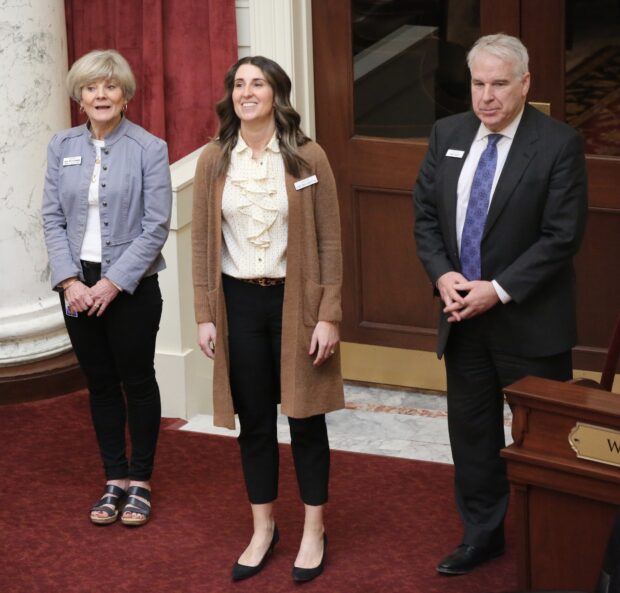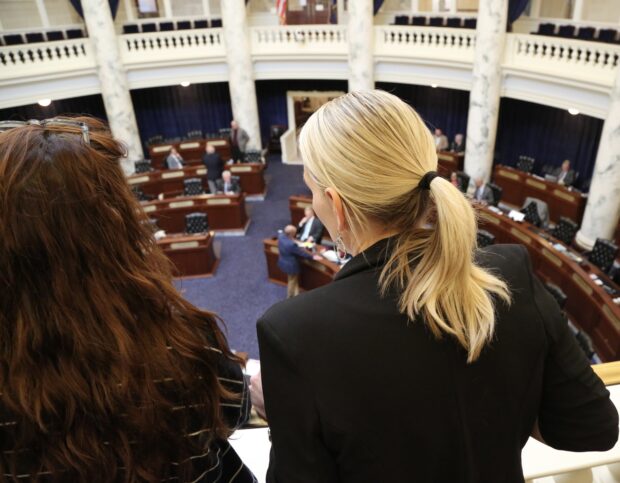
The 2023 legislative session is finally a done deal, as of 12:37 p.m. Thursday.
So let’s recap. What passed and what failed in the education space?
What did happen
Property tax overhaul. It was the biggest tax bill of the session — and education figured prominently in the discussion. Promising up to $355 million in immediate tax relief to Idahoans, House Bill 292 also promises schools $100 million to apply to property tax relief, such as paying off bonds or levies. HB 292 became law on a veto override, the first since 2007.
March election nixed. Here’s the flipside to HB 292: It eliminates the standalone March school election, and the date schools most commonly use for bond issues and supplemental levies. Little cited this section of the bill in his veto. The Senate tried to reinstate the March election date, but ran into a political buzzsaw on the House floor.
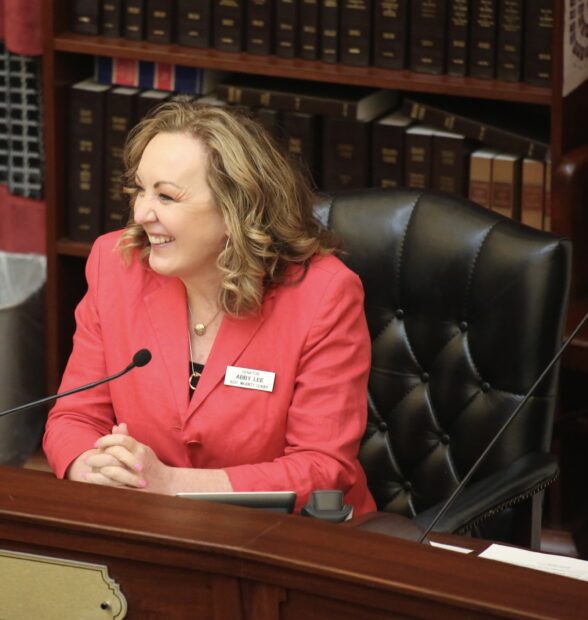
Idaho Launch. It emerged as one of the big education fights of the year: Gov. Brad Little’s proposal to steer high school graduates into in-demand careers. After several long hearings and close votes, it finally passed. Starting with the class of 2024, grads will get up to $8,000 for community college, career-technical education or job training.
$50 million for CTE. Another $50 million will go to support career-technical education across Idaho, especially in rural and remote areas, through added-cost funding and a new capital fund available to school districts. The money is part of the state superintendent’s goal to support workforce training for students as young as seventh grade.
Teacher pay raises. Teachers should see salary boosts this year — if districts follow through on guidance from the Legislature. The budget provides $145 million for teacher pay raises, calculated at $6,359 per full-time employee, and should raise the starting teacher salary to around $47,477. But since salaries are set at the local level, there’s still wiggle room.
Classified staff pay. School districts will get an additional $97.4 million to help pay salaries for classified staff, such as classroom paraprofessionals and non-teaching staff like IT professionals or cafeteria workers. This doesn’t necessarily translate to a pay raise. The idea is to pick up some of the payroll costs that now fall to districts — a nearly $100 million funding gap, highlighted in a December Office of Performance Evaluations report.
Empowering Parents. Little got his wish here, and it means more families could get help paying for computers, tutoring or learning materials. After a razor-thin House vote Friday, lawmakers agreed to make the popular federally funded grant program permanent. Now, $30 million of state money will go into the next round of grants.
A smooth session for higher ed. Relatively speaking, anyway. The Legislature essentially agreed to Little’s higher education budget request. Lawmakers also funded $72.9 million for building projects across Idaho campuses. Parents and students will have to wait until later this month for a decision on 2023-24 tuition and fees, which have been frozen for three years.
Bathroom bill. Schools will now require students to use the bathrooms and locker rooms that correspond with their gender assigned at birth. The Legislature passed the law in response to pushback in Caldwell, where trustees came under fire over a proposed LGBTQ+ policy based on gender identity. Little signed it into law last month.
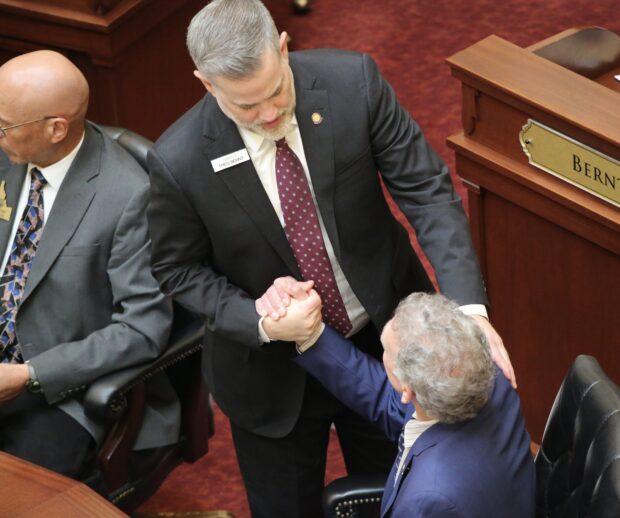
A ‘Parental Bill of Rights.’ State superintendent Debbie Critchfield hit the ground running this session. Her first piece of legislation, dubbed the Parental Bill of Rights, received the governor’s signature on March 17. The law is intended to increase communication and partnership between parents and their school districts.
Financial literacy. The 2023 legislative session resulted in a new grad requirement for high schoolers — financial literacy. The new law is part of Critchfield’s plan to better prepare Idaho students for life after high school. Little signed the bill on March 20.
Open enrollment. The Legislature has made it a little bit easier for parents to move their children to another school. Lawmakers updated the state’s open enrollment policy for the first time in 30 years. Now, all districts will have to offer open enrollment, and post information on their policies online.
Restraint and seclusion restrictions. Classroom management could look different this year, after the Legislature passed regulations on some methods of seclusion and restraint. The law bans corporal punishment and chemical restraints in schools, and limits the use of restraint or seclusion to situations when a student or staff member is in “imminent danger.”
Teacher apprenticeships. Students might be able to get paid classroom apprenticeships while they pursue a bachelor’s degree. The apprenticeship bill sailed through both houses.
An Idaho dino. If you’d never heard of orcytodromeus before the 2023 session, don’t worry. Some enterprising Idaho fourth-graders took care of that. They made the case for the “ory,” a herbivorous burrowing dinosaur found only in Idaho and a sliver of Montana. The ory bill sailed through both houses, and Little signed it into law last week.
What didn’t happen
Education savings accounts. Conservative lawmakers pushed the most aggressive school choice bill of the year — a “universal” education savings accounts bill with a first-year price tag of $45 million. Some lawmakers feared the costs would quickly outstrip the initial estimates, and thought a universal ESA bill was too much, too soon. It died on the Senate floor.
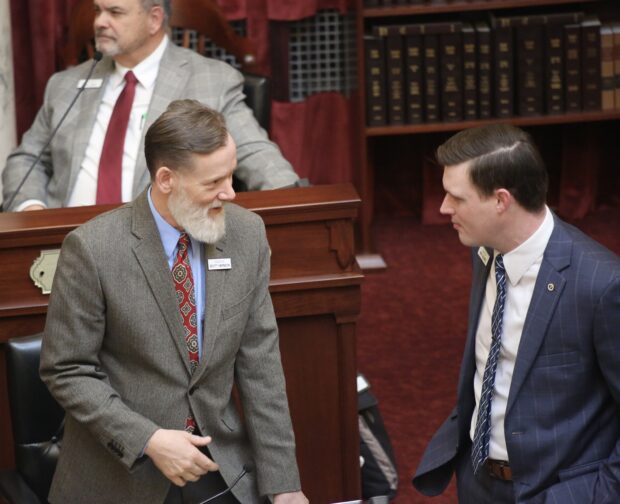
Private tuition grants. The only school choice bill to pass either the House or the Senate, this five-year, $12 million-a-year pilot would have funded 2,000 grants, totaling $6,000 apiece. The Senate said yes. But the idea never had the votes to get out of the House Education Committee, and died without a hearing.
Blaine Amendment repeal. Idaho’s Blaine Amendment still stands, despite attempts in the House and Senate to push for a repeal. The constitutional clause prohibits public dollars from going to religious institutions, including parochial schools, and is considered one of the biggest obstacles to legislation. Proposals to repeal the amendment never made it out of committee. A proposed repeal would need to go before Idaho voters on the November 2024 ballot, or later.
School choice advisory vote. As of now, voters won’t see a school choice advisory question on their November 2024 ballots either. The ballot question, proposed by Rep. Lori McCann, R-Lewiston, would have asked voters to approve or disapprove of attempts to put public money toward private education (through ESAs, vouchers and the like). House lawmakers vehemently opposed the idea, and killed the bill on March 21.
A crackdown on libraries. This one came down to the 88th and final day of the session. Lawmakers passed a controversial bill requiring school and public libraries to keep “harmful” materials away from minors — or risk paying parents a $2,500 fine. Little vetoed the bill Wednesday, calling it a library “bounty.” The House fell one vote short of an override.
Karen Echeverria. In a rare rebuke, the Senate rejected one of Little’s appointments. The governor wanted Echeverria, the longtime head of the Idaho School Boards Association, to take a seat on the Idaho Public Charter School Commission. Critics said they wanted a strong advocate on the commission, which also has a role in charter regulation.
Sex education. A pair of sex-ed bills stalled out this session. An “opt-in” bill would have required parental consent for sex ed. That bill died in a House committee, so Idaho’s opt-out policy remains in effect. The Senate passed a bill prohibiting sex ed before fifth grade, but the House never took it up.
Free feminine hygiene products. Female students won’t find free tampons and pads in their school bathrooms. A bill seeking to make it happen — part of McCann’s effort to eliminate “period poverty” among Idaho students — failed in an evenly split House vote on March 20.
An elected State Board. Multiple attempts to transform the State Board of Education into an elected body failed this session. All the attempts came from one Coeur d’Alene lawmaker, Rep. Joe Alfieri. He also brought forward a slew of other election bills, including a proposal to eliminate the March and August school election dates, and a separate bill to move school board races to November in even-numbered years, alongside races for president or governor.
School board trainings. One push from the state superintendent failed this session — an attempt to require training for school board trustees. Critchfield’s goal was to improve student outcomes and school board efficiency, and help boards avoid litigation. But lawmakers rejected the bill on March 8.
